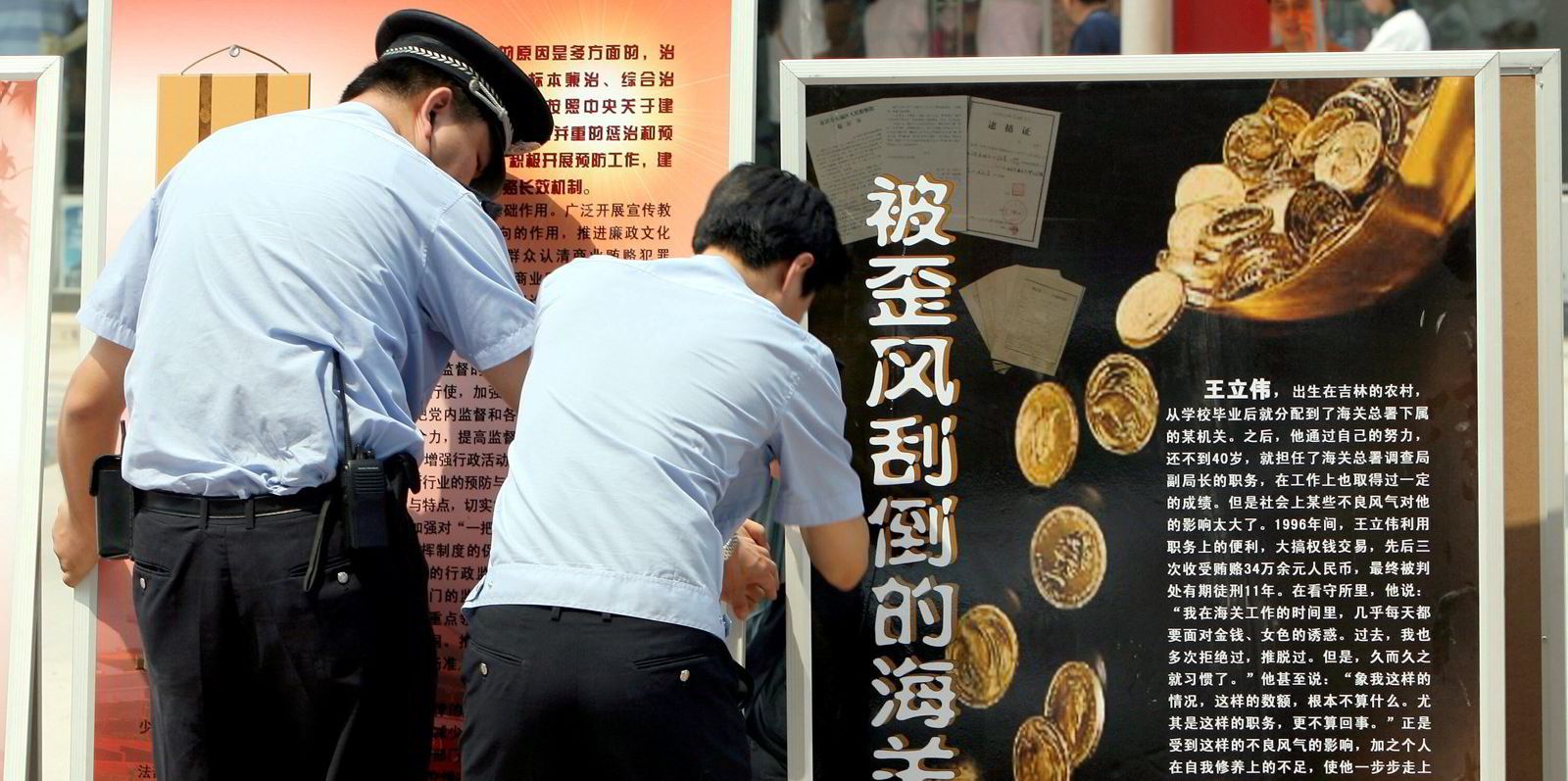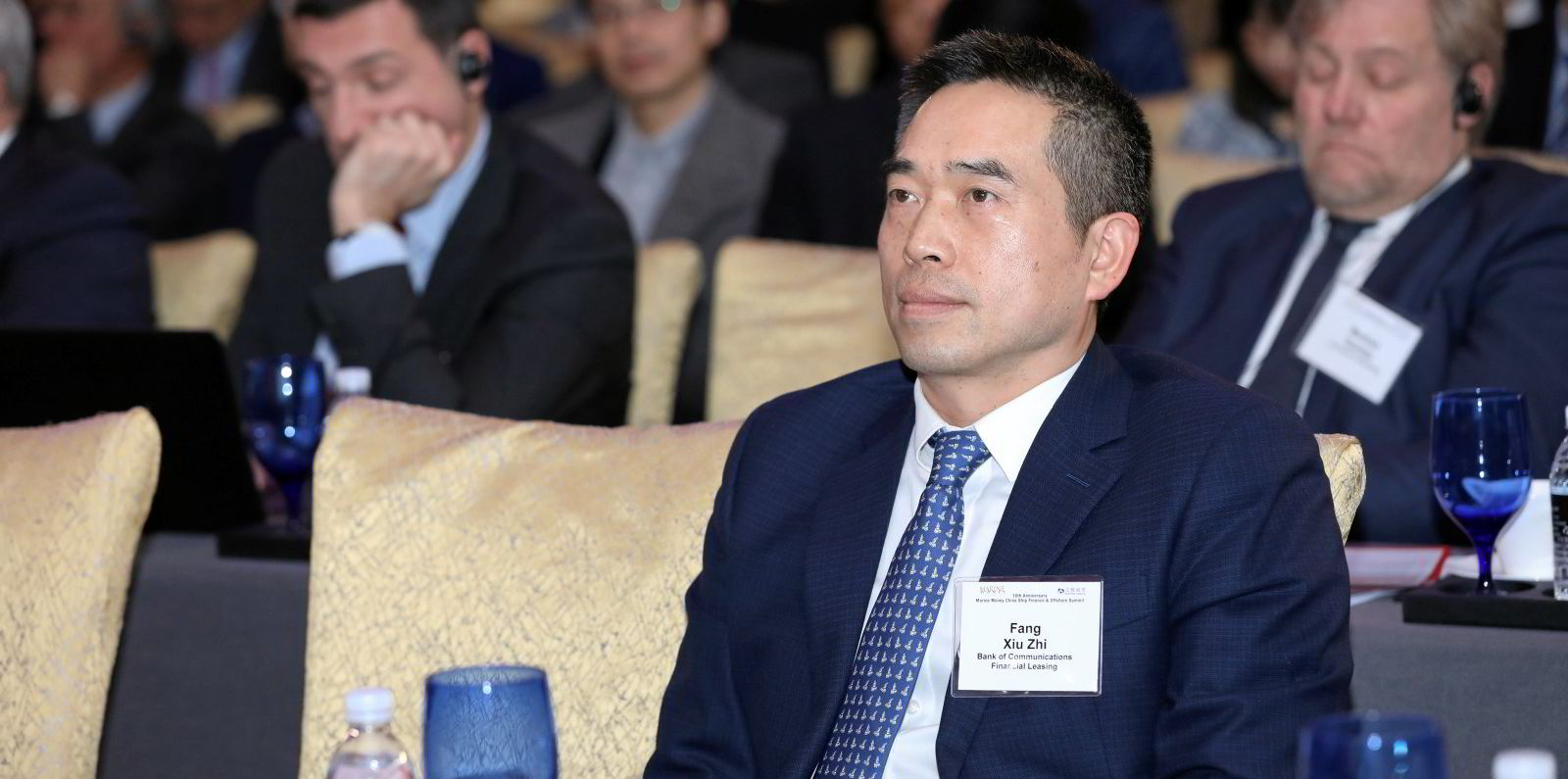The latest detentions of shipping bankers from China’s massive leasing sector has sent a nervous ripple through the global maritime sector. An increasing number of foreign shipowners have been using Chinese leasing companies for finance in place of a still-depleted Western funding base — wounded by the post-2008 slump.
The wave of official investigations has unnerved what has been a booming business area and there are plenty of questions about what is behind the crackdown and what it will mean.
Among the latest arrestees are Yang Changkun, the former head of shipping at ICBC Financial Leasing who also goes by CK Yang, and Norwegian shipowner David Wu of Landmark Capital, who were taken away by officials of the Beijing branch of the Party’s Central Commission on Discipline Inspection.
Earlier this month, TradeWinds reported on the arrests of Bank of Communications Financial Leasing (Bocomm Leasing) head of shipping Fang Xiuzhi and Minsheng Financial Leasing head of shipping Fan Qiyong.
Those arrests follow the detention earlier this year of two executives who had played a leading role in the maritime business expansion of the Export-Import Bank of China.
The latter arrests were also made by officials from the country’s anti-corruption authorities but information is scarce — as is often the case in China — about the exact nature or purpose of the probes.
What we do know is that there has been a series of robust interventions into two other business sectors over recent years: real estate and tech.
Both involved arrests of high-profile executives and had a serious dampening effect on business confidence and volumes.
More detentions are expected and “yes” they will likely dampen overall business activity and make executives particularly cautious about lending to non-Chinese owners.
Those crackdowns were driven by fears inside the upper echelons of the ruling Chinese Communist Party about the dangers of speculative bubbles and over-indebtedness to the wider economy and the potential corruption of party members.
Critics also say some of this could be partly political: a government signalling to high-profile tech bosses such as Jack Ma of Alibaba and Ant Group fame that they should align themselves with the needs of the country and not criticise authorities.
Western economic analysts have repeatedly warned a Chinese economy that has grown so fast over recent decades has become far too dependent on unrealistic levels of borrowing.
The Beijing government has denied the system is fragile but has tightened regulation. For instance, it introduced the Three Red Lines and other policies to tighten leverage requirements in real estate.
Last December, the country’s largest property group, Evergrande, defaulted on loans around some of its $300bn-worth of debt, causing a major sell-off in other property stocks.
Meanwhile, the tech sector has been under the cosh for the past 18 months with more than 50 regulatory actions against dozens of companies for alleged data violations and anti-trust abuses.
When Alibaba’s Ma disappeared for three months in November 2020 just ahead of the initial public offering of The Ant Group, it was presumed he had been arrested (although no one still quite knows where he went). The IPO was scrapped and an anti-monopoly probe started into his Alibaba business.
Meanwhile, the Beijing tech probe sucked in other leading companies, such as video gaming giant Tencent and food delivery group Meituan.
Billions of dollars have been wiped off the value of the Chinese tech sector at a time when the local economy is still reeling from the impact of heavy Covid-19 lockdowns.
There are question marks over whether China can meet its 5.5% GDP growth target in 2022 and this is the environment in which the ship-leasing companies are under review.
It is likely that a myriad of concerns will have triggered the detentions and probes.
Are the leasing companies such as the real estate firms or tech companies properly regulated? Are they taking dangerous risks with their lending? Is the gradual expansion from financing Chinese shipping to foreign maritime interests in the national interest in the eyes of the ruling party? Or are the incentives that play a part in the deals considered too great of a temptation?
There is no doubt that Chinese leasing firms are currently less tightly regulated than their Western counterparts, which has allowed them to offer shipowners more “generous” loan-to-value deals.
This may need to change while it is easy to see these arrests and crackdowns in the context of an overbearing and authoritarian state.
Yet the lax attitude of Western governments and regulators towards their own banking sectors caused the 2008 financial crash, which so damaged the world economy — and, ironically, ultimately turned many Western shipowners towards Chinese finance.
So what will be the outcome of the probe into ship leasing? More detentions are expected and “yes” they will likely dampen overall business activity and make executives particularly cautious about lending to non-Chinese owners.






